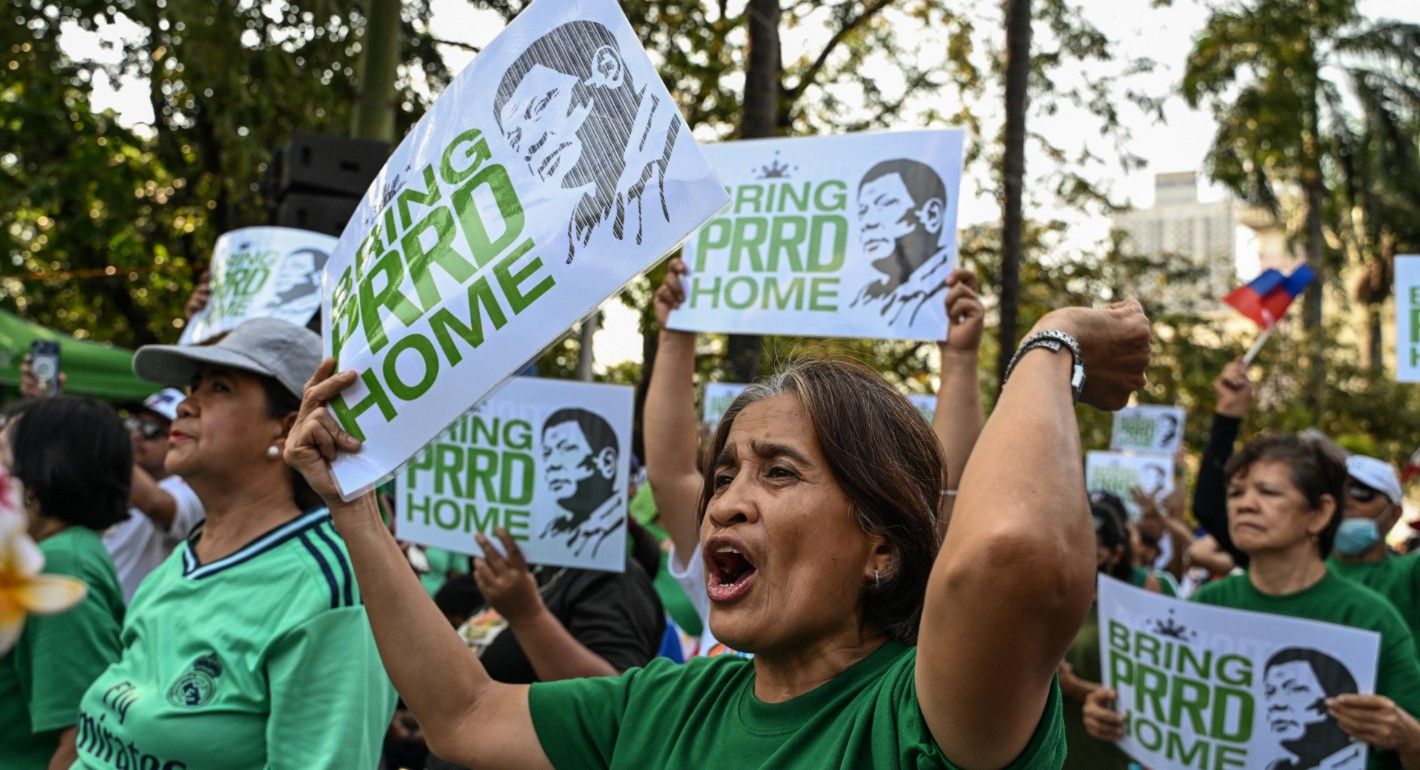Polarized Opinion: The Arrest of Duterte
Court Legal ProceedingsPosted by AI on 2025-08-25 09:43:28 | Last Updated by AI on 2025-08-26 18:05:38
Share: Facebook | Twitter | Whatsapp | Linkedin Visits: 0

The former president of the Philippines, Rodrigo Duterte, was arrested for extrajudicial killings under the guise of his administration's war on drugs campaign. While this has been hailed abroad as a rare win for justice, the domestic reaction in the Philippines is deeply divided. This decision has larger implications for the country's political landscape ahead of upcoming midterm elections, with two prominent political dynasties now on a collision course. The arrest also reveals the country's abysmal track record of holding elected officials accountable and exposes the weak demand for accountability within the Philippines.
The White House will have to navigate Trump's transactional approach to foreign policy with the partnerships deeper concerns. Can Biden find common ground with Asian leaders on democracy and human rights? The Asia Program in Washington studies disruptive security, governance, and technological risks that threaten peace, growth, and opportunity in the Asia-Pacific region, including a focus on China, Japan, and the Korean peninsula.
The arrest of Duterte underscores the uneven state capacity and insufficiently inclusive growth in the region. The Asia Program in Washington studies disruptive security, governance, and technological risks that threaten peace, growth, and opportunity in the Asia-Pacific region, including a focus on China, Japan, and the Korean peninsula.
Rodrigo Dutertes sudden arrest for his war on drugs campaign, which resulted in the killing of more than 30,000 men, women, and children, comes at a moment of political uncertainty in the Philippines. This dramatic development has been celebrated by pro-democracy activists and victims' families, who have long demanded accountability. But this arrest also puts the two most prominent political dynasties in the Philippines on a collision course with serious and imminent implications for domestic politics.
The Philippines has an abysmal track record of holding elected officials accountable, and powerful politicians routinely get away with corruption or even murder. Over the years, successive presidents have systematically undermined and, in the case of Duterte, threatened institutions that can serve as a check on their power. With the arrest of Duterte, the tide may be turning, but the recipe for justice is murky at best.
Search
Categories
- Sports
- Business
- History
- Politics
- International
- Science & Technology
- Social Issues
- Disaster Management
- Current Affairs
- Education
- Startup Business
- Startup News
- Awards
- Community Services
- Fundraising Events
- Volunteer Services
- Health Initiatives
- Innovations and Initiatives
- In News
- Banners
- Awards
- Partners
- Products
- Press Releases
- News
- Fast Check
- South
- సినిమా
- Gallery
- Sunday Chronicle
- Hyderabad Chronicle
- లైఫ్ స్టైల్
- National
- క్రైం
- ట్రెండింగ్
- జాబ్స్
- అంతర్జాతీయo
- బిజినెస్
- రాజకీయం
- బిజినెస్
- సంపాదకీయం
- నవ్య
- చిత్ర జ్యోతి
- క్రీడలు
- జాతీయం
- తెలంగాణ
- తాజా వార్తలు
- మన పార్టీ
- మన నాయకత్వం
- మన విజయాలు
- డౌన్లోడ్స్
- మీడియా వనరులు
- కార్యకర్తలు
- North East Skill Center News
- Government Schemes
- Entrepreneurship Support
- Employment Opportunities
- Skill Training Programs
- Departments
- Investments
- Initiatives
- Resources
- Telangana IT Parks
- Events & Jobs
- Press Releases
- News
- Airport News
- Newtons Laws of Motion
- Karbonn in Business
- Investments in Karbonn
- Company quarterly sales
- Markets
- Auto News
- Industry
- Money
- Advertisements
- Stock target
- Company Updates
- Stock Market
- Company Sales
- Staffing and HR
- Constituency Assembly
- General News
- Srikalahasti Temple
- Bojjala Sudhir Reddy
- Technology & Innovation
- Sports
- Business
- Products
- Industries
- Services & Trainings
- Tools & Resources
- Technology Integration
- Drug Seizures & Arrests
- Telangana Narcotics
- Law & Enforcement
- Rehabilitation
- Nationwide Drug Policing
- Nigeria Seizures
- Global Operations
- Drug Awareness
- Drug Enforcement Tech
- NCB Drug Seizures
- Judicial Crackdown
- India's Surveillance Tools
- Cross-Border Links
- Women Safety
- Cyber Crimes
- Drug Abuse
- Traffic & Road Safety
- Community Connect
- Public Safety Alerts
- Citizen Assistance
- Nellore City News
- Politics & Administration
- Events & Festivals
- Agriculture & Rural
- Business & Economy
- Health & Wellness
Recent News
- Indian Navy's Twin Stealth Frigates Mark Progress and Self-Reliance
- Army Officer Banned From Flying For 5 Years Due To Assaulting Airline Staff
- Man Kills Self After Wife Refuses To Cook Egg Curry For Karu Bhat Observation
- India, US Firm GE Near $1 Billion Engine Deal For Indigenous Fighter Jets
- 'Walking Together In Harmony Is The Essence Of The Hindu Way': RSS Chief At RSS Centenary
- Devastating Impact: Vehicles Stuck as J&K's Tawi Bridge Caves In amid Heavy Rain
- Tragedy Strikes Vaishno Devi, 15 Pilgrims Killed In Landslide
- Ganesh Chaturthi 2025: Festivities Begin In Less Than A Month, Mumbaikars Gear Up For Traffic Jams